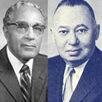The Wesley-Logan Prize in African diaspora history is jointly administered by the American Historical Association and the Association for the Study of African American Life & History. The prize is awarded annually for an outstanding book in African diaspora history.
The prize is offered for a book on some aspect of the history of the dispersion, settlement and adjustment, and/or return of peoples originally from Africa. Eligible for consideration are books in any chronological period and any geographical location. The current prize amount is $1,000.
The general rules for submission are:
- Only books of high scholarly and literary merit will be considered.
- Books with a copyright of 2025 are eligible for the 2026 award.
- Nomination submissions may be made by an author or by a publisher. Publishers may submit as many entries as they wish. Authors or publishers may submit the same book for multiple AHA prizes.
- Nominators must complete an online prize submission form for each book submitted. Once you fill out the form you will receive an email with the committee’s contact information.
- One copy of each entry must be sent to each committee member and clearly labeled “Wesley-Logan Prize Entry.” Print copies preferred unless otherwise indicated. If only e-copy is available, please contact review committee members beforehand to arrange submission format.
Please Note: The competition will open in mid-March 2026. Entries must be received by May 15, 2026, to be eligible for the 2026 competition. Entries will not be returned. Recipients will be announced on the AHA website in October 2026 and recognized during a ceremony at the January 2027 AHA annual meeting in New Orleans.
For questions, please contact the Prize Administrator.

Charles H. Wesley and Rayford W. Logan
The AHA Committee on Minority Historians established the prize in 1992 in memory of two early pioneers in the field, Charles H. Wesley and Rayford W. Logan. Charles Harris Wesley (1891–1987) taught for decades at Howard University and served as president of Wilberforce University and founding president of Central State University. Rayford W. Logan (1897–1982) was professor emeritus of history at Howard University.
Past Recipients
Current Recipient
Beeta Baghoolizadeh, Columbia University
The Color Black: Enslavement and Erasure in Iran (Duke Univ. Press)
The Color Black is a groundbreaking historical excavation of 19th- and 20th-century Afro-Iranian children, women, and men through enslavement, abolition, and erasure. Creatively employing a myriad of archival sources, including film, family records, and caricatures, Beeta Baghoolizadeh demonstrates how blackface performances and anti-Blackness endured in an understudied country of the African diaspora. The book offers an essential correction to this painful historical amnesia while remaining attentive to the humanity and legacies of East Africans and Afro-Iranians.